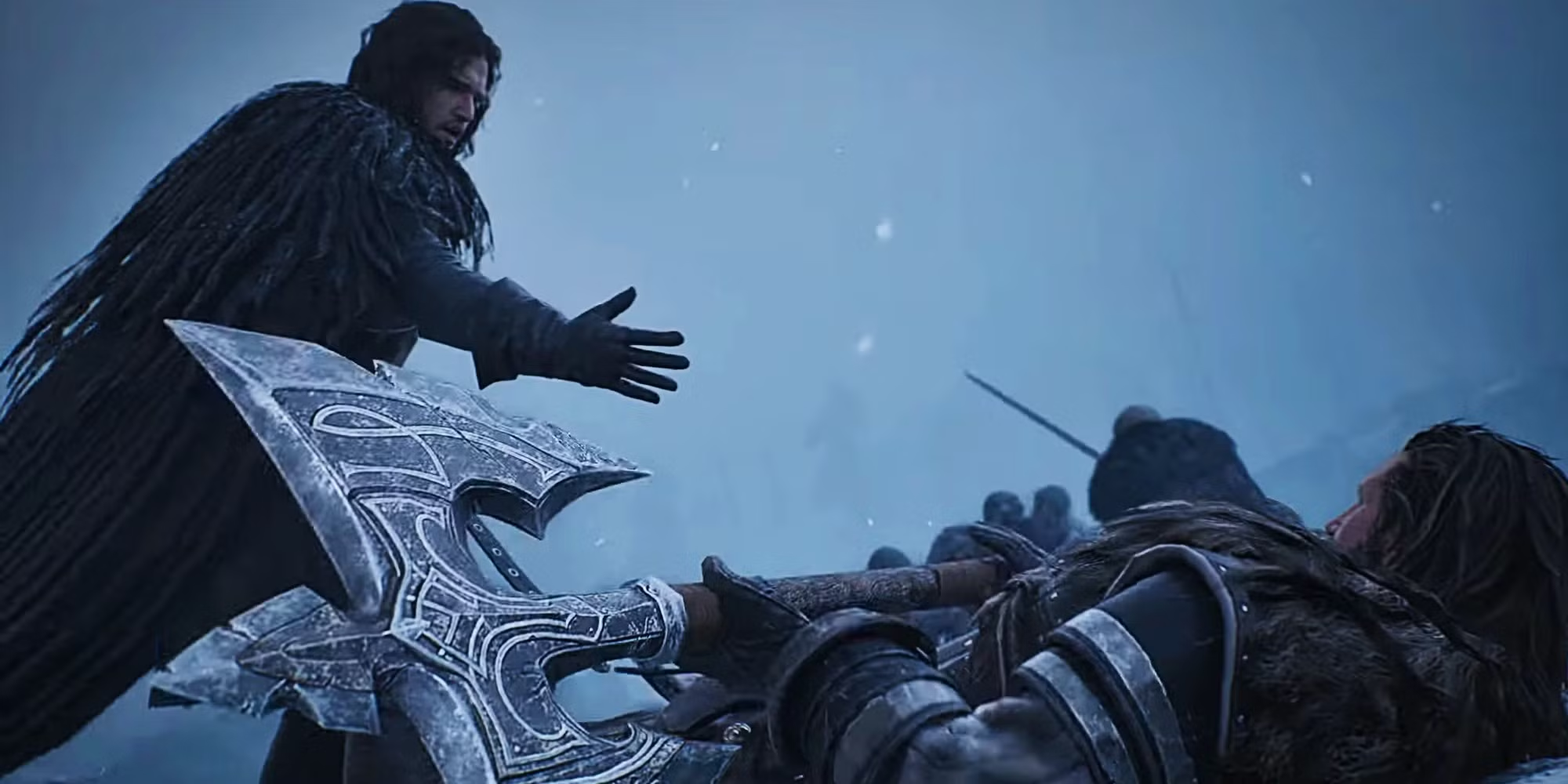George R. R. Martin authored an impressive dark fantasy that nonetheless betrayed the genre’s core mission.
This month, A Game of Thrones by acclaimed fantasy author George R. R. Martin turns 25. While Martin’s book series — collectively titled A Song of Ice and Fire — is inseparable from the more popular HBO adaptation, the books were what originally spurred a massive tonal shift in fantasy literature that the show simply imitated.
While HBO created what may be modernity’s last instance of shared popular culture (nothing will reach Sopranos-like ratings ever again, as the later seasons of Game of Thrones managed), much of the show’s best stuff was lifted straight from the books. The characters lost within political labyrinths, often of their own making; the sense of mystery and impending doom that lingers over the Night King and his army of White Walkers; even the racy, sex-crazed parts of the show (artifacts from the last years in which Americans could be scandalized by media) — all are present in Martin’s original.
The character of Tyrion Lannister provides one of the most compelling examples of this “one-for-one” quality between the book and the show. Tyrion is a variant of the slacker-genius archetype, granted a perfect combination of wit and political instinct, along with Martin’s down-to-earth depiction of how such a troubled-yet-brilliant tactician might think and act.
The character himself is not that revolutionary — someone with even basic cultural literacy in movies and books has seen many slacker-geniuses — but Martin’s uncanny prose style contains a detailed realism that brings Tyrion to life on the page.
Peter Dinklage’s on-screen depiction of Tyrion matches the book pitch-perfectly. Not since Peter Jackson cast a B-list Danish-American art snob for the role of Aragorn, King of Gondor (and Arnor!), has a fantasy actor surprised audiences by rising so fully to the occasion, as Dinklage did with Tyrion, a boozing but brilliant man with dwarfism. Debauched, yes; but not so badly by the standards of debauchery within the Lannister family.
In fact, to describe Tyrion is also pretty much to describe this first book — and Martin’s entire saga: coarsely obsessed with politics, to the exclusion of almost everything else (except for occasional bouts of sex and/or violence).
Martin’s Machiavellian revolution of modern fantasy literature has its merits, but his series betrays the genre with just how un-fantastical it is. While he keeps the basic trappings and tropes of fantasy (esoteric magic, castles, dragons, royalty, extensive background lore, spooky-sounding dead languages, etc.), Martin’s revealed preference is instead to use fantasy as a backdrop or window dressing for what is essentially a type of bloated Agatha Christie plotline.
Much of A Game of Thrones’s plot centers on a “whodunit” mystery, as Catelyn Stark, the matriarch of the Stark family, our protagonists, scurries around like Harrison Ford desperately trying to discover who ordered a failed assassination attempt on her son, Bran. What’s so odd is that the reader’s immediate intuitions about the identity of the evil mastermind are effectively confirmed by the end of the series. The quest to find the schemer just drops out of the story over the next four books, and the deflated resolution to this plotline has only ever occurred in the show (Martin failed to catch up with the breakneck pace of HBO’s programming). Within the pages of this first book, though, the assassination plotline goes nowhere as the reader witnesses the characters become practically amnesiac about it in real time.
None of this is to say that A Game of Thrones lacks dramatic merit. While it is true that Catelyn and Bran are duds, most of the vast array of characters Martin crams into the book have singular, interesting personalities. The stoic, honorable Ned Stark is remarkably different from many of the overstated, bombastic male characters in the fantasy stylings of the time, and Martin’s decision to . . . er, let certain events happen to him provides a genuinely dramatic twist. Martin shows a willingness to put his most interesting characters in peril through the book, meaning that the reader can never be completely sure that the most interesting protagonists are safe from harm.
Martin’s best storytelling tactics are synthesized in the character of Sansa Stark, the eldest daughter of the family, and one of the more underrated characters of modern fantasy. She has the calculating brilliance like many others in A Game of Thrones (including Tyrion, but equally Littlefinger and Varys). Unlike many of these others, however, Martin puts her in a situation that is uniquely perilous right from the get-go.
Events in the first book lead to Sansa’s being effectively kidnapped and used as a bargaining chip by the Lannister family for much of the rest of the saga. But the Lannisters, in their extreme cruelty, are in constant debate about whether or not Sansa is worth keeping around, given all of the trouble and political hassle she generates. Sansa’s chapters in A Game of Thrones show Martin’s obsession with cynical politics at its best, as the clear and present danger of Sansa’s circumstances forces her to devise ever cleverer and more pointed rhetorical schemes to justify her value as a living hostage to the Lannisters. Through the whole saga, Sansa’s politicking is unmatched in its brilliance. But the narrative come-down is agonizing and slow for Sansa; her reward at the end of the saga for her incredible displays of political instinct is entirely predictable, and observant readers will likely be able to guess the outcome for Sansa based on the information he or she has access to in this first book. Readers cannot help but feel that Sansa’s author has gifted her a consolation prize.
In this sense, Martin presages the “subverting expectations” silliness that has obsessed other modern, “gritty” storytellers. That phenomenon went from a simmer to a full boil a few years ago with Rian Johnson’s treatment of Star Wars in The Last Jedi — a film in which the audience’s expectations are subverted (as the memes from this period remind us) precisely because nothing is surprising, and almost every character’s story fails to pay off. A Song of Ice and Fire does the same thing, just on a larger scale and with more complex plot mechanics — which is what makes it even more frustrating.
These markers of Martin’s storytelling — the crude, matter-of-fact methods by which he quashes the reader’s hope for a higher mystery within the story, the way the book becomes predictable as the reader grows accustomed to interpreting every event through a lens of cynical Machiavellianism — have come to define modern “dark fantasy.”
To crib an argument from Ross Douthat, “dark fantasy” was originally an imprecise term to describe the attitudinal approach of authors who wanted to write darker, grittier, or horror-inspired versions of fantasy. But given time, dark fantasy came to describe novels set in a pseudo-mythological past that was, for all intents and purposes, godless.
To be sure, dark fantasies are replete with “deities,” such as Arioch, one of the beings known as Chaos Lords in Elric of Melnibone by Michael Moorcock. Arioch serves as King Elric’s perverse guardian angel, granting him power and knowledge as Elric becomes his thrall. But Arioch could only be called a “god” in a polytheistic sense. He’s just one of countless equally powerful, magical, undying entities that vie for control over the material world.
Generally, dark fantasy lacks a capital-G God in the biblical sense. There are rarely figures that could be considered the Lord of creation — instead, authors build worlds wherein supernatural power is non-omnipotent, limiting the scope of any one deity’s ambition. Godly magic in such settings remains factional — power remains firmly in the realm of the political, the coalitional, and in the harsh mathematics of risk and reward.
By this definition, A Game of Thrones would appear to be a snug fit within the confines of dark fantasy. It could even be the subgenre’s high point, as Martin strips away as much stereotypical magical fantasy imagery as possible. Sure, there are dragons, there are magical ice people, and there are suggestions of sorcery originating in far-flung exotic lands. But the reader spends a vanishingly small proportion of the story considering such impossible elements, as Martin opts for greater amounts of realpolitik and court-intrigue. The fantastical elements make comebacks at moments when their reality-bending capabilities serve a dramatic climax, but they then recede into the background. The major exception to this is the dragons, which Martin dedicates more and more time to as the books go on, and which become increasingly tedious as he forces the reader to care about the flying death cannons, with hearts of gold.
But Martin inverts the basic ethic at work in dark fantasy: that the world’s cruel politics are not the point of the story. This ethic is why dark fantasy tends to be interesting in the first place; it shows characters who live in a fundamentally pagan world, where no higher power guides world events toward the good, where people suffer not only needlessly and excessively in the material world, but often eternally in the afterlife as well, with no redemptive pathway.
Through this cynical interpretation of human life, dark-fantasy authors often arrive at profound observations about humanity’s character by showing readers how their protagonists adapt to a world without a biblical ethic, where there is no clear spiritual reward in doing good for good’s sake, even (and especially) when doing so is difficult.
Such an ethos means that dark-fantasy authors often eschew the complex political schemes developed earlier in their work as their sagas continue. Their protagonists come to understand that doing anything good in their fallen world requires individual action outside the purview of corrupt institutions. One of Elric’s first actions is to abandon his post as king, for example.
Not for Martin, though — A Game of Thrones sets the tone for the whole series, as it is procedurally revealed that there is nothing beyond conventional politics for this author. There are no events in the saga not swallowed up by court-intrigue, political assassination, cynical demagoguery, the politics of sex, the politics of violence, the politics of . . . politics, on and on forever. Even the White Walkers, introduced in the first book, do not bring about major political shifts until later in the story — and even then, their presence does not completely end the books’ trademark political maneuvering.
Martin may have therefore sacrificed the one method of achieving a hero’s arc in a dark fantasy setting — by reasserting humanity’s rare-but-necessary acts of simple, unprompted, unrequited goodness, and by explicating the ways in which such goodness is heroic — in exchange for even more darkness, grit, and nastiness.
But the result is that the story is actually rather safe. Once the reader becomes desensitized to the story’s brutality, and to the fact that Martin has a tendency to “subvert” expectations by simply confirming one’s worst fears rather than through genuine surprise or inventiveness, it becomes easy enough to read the stage directions in advance. For proof — and spoilers — look no further than Ben Shapiro, who predicted an almost entirely accurate version of the HBO show’s ending for years. Facts really don’t care about George R. R. Martin’s feelings, evidently.
The rinse-repeat quality of the story isn’t completely obvious by the end of this first book, now turning a quarter-century old. Fantasy nerds would be forgiven for picking up the next installment — as many of them did — to see how their favorite characters would escape Martin’s grim entanglements. But the boundless cynicism of A Game of Thrones’s politics begins to wear on attentive readers (and perhaps even on the book’s author, who has yet to finish his series), much as the boundless cynicism of, well, the real world’s politics do. Reality is filled with political capriciousness, suspicion, and frighteningly boring corruption. May the fantasy readers of the next 25 years realize that we don’t need it in our fiction, too.




















![[Book Review] The Blade Itself (The First Law Trilogy) by Joe Abercrombie](https://bendthekneegot.com/wp-content/uploads/2018/01/1516047103_maxresdefault-218x150.jpg)


















